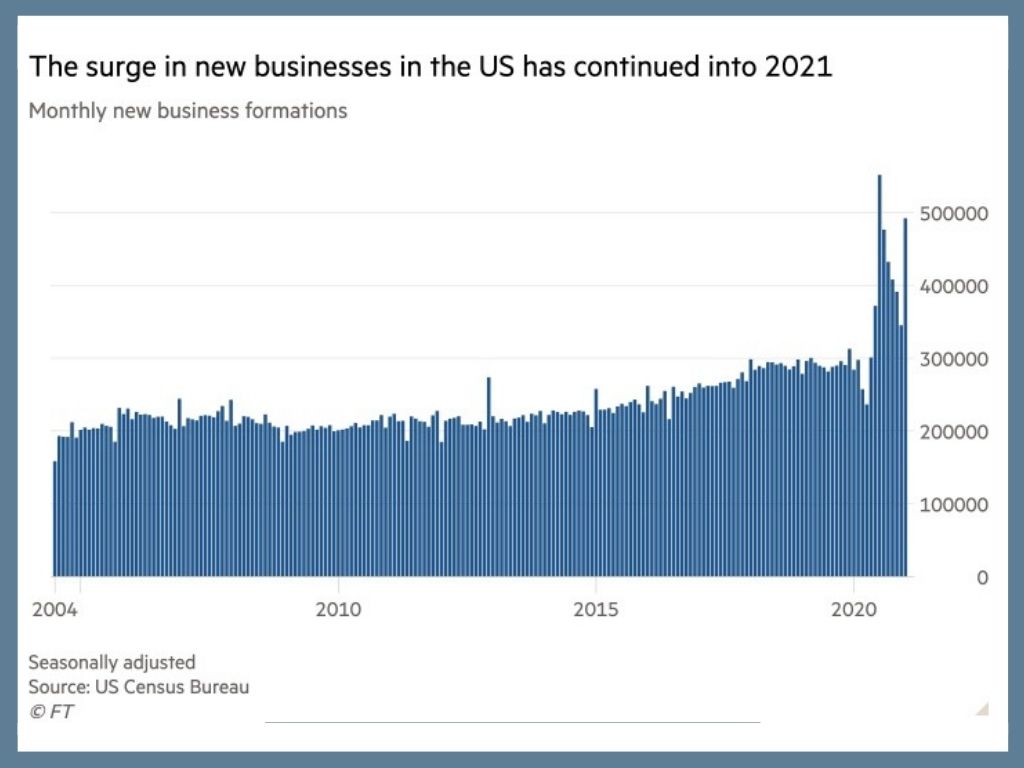The pandemic and past economic downturns can be building blocks for the future
The past 12 months have been, to say the least, a wild ride. COVID-19 and the virus that causes the disease disrupted daily routines and traditional modes of doing business in ways that most Americans never could have imagined.

Despite the roller coaster known as the coronavirus pandemic that we’ve all be been forced to endure, one thing has remained relatively unchanged: America’s entrepreneurial spirit. The resolve to never give up and to keep pushing forward in the face of seemingly unsurmountable odds is a characteristic that tends to shine through in even the darkest of times.
In fact, the pandemic apparently emboldened millions of would-be entrepreneurs to dust off those business plans they may have been storing in the desk drawer and become their own bosses.
U.S. Census Bureau statistics show that more than 4.4 million people submitted new business applications in 2020, compared to 3.4 million in 2019. Of those, roughly 35 percent were categorized as “likely employers,” which offers hope for job creation and bringing much-needed good news to the labor market.
So as we move forward in 2021, here are six lessons learned from the past year as well as through the last two recessions that we will serve us well as we strive to keep the American entrepreneurial spirit alive:
1) Stay hungry.
Given its size, Amazon may not be the first name that comes to mind when you think of “entrepreneurial.” However, founder and former CEO Jeff Bezos transformed what started as an online bookseller into one of the most dominant brands and successful companies in the world by approaching every aspect of business as a startup might. He calls it the “Day One mentality.”
At Amazon, everyone is encouraged—in fact, mandated—to approach each day as if it was the first. They’re conditioned to always bring the same level of excitement, innovation, and passion to the table as a group of founders might on the day they founded a company. Lose sight of this entrepreneurial drive, and the entire enterprise suffers.
“Day 2 is stasis,” Bezos says. “Followed by irrelevance. Followed by excruciating, painful decline. Followed by death. And that is why it is always Day 1.”
2) Focus on your people.
Most leaders will tell you their employees are the cornerstone of their business and that caring for them is fundamental to their success.
Sadly, the foundation of countless companies cracked or crumbled in 2020, when millions of workers were sent to unemployment lines as their employers attempted to slash costs any way possible. That’s the opposite of taking care of your people; it’s focusing solely on numbers in the short term rather than a vision for the long term.
At Kester Search Group, we—like most businesses that remained open during the pandemic—had to shift to a fully remote workplace. We also had to restructure some parts of our compensation plan and make other concessions to weather the storm. It wasn’t easy, but through continual communication and keeping people focused on the big picture, we were able to retain our entire team and are now actively hiring and growing again.
Now, we have our full team in place as we enter this economic rebound, and we’re the busiest we’ve been in seven years coming fresh off the 2020 economic meltdown. The only reason we’re able to execute on the Executive Search and Commercial Expansion projects that we have today is because we remained focused on retaining our entire team during the lean periods, even when it seemed like it might not be possible.
3) Capitalize on opportunities.
In business, challenges often give way to opportunities. The key, of course, is recognizing them and seizing the moment.
Last year, a market-leading oncology company that we’ve been working with used the pandemic as an opportunity to bolster its human capital. As other businesses were initiating massive cuts in labor, this company went into hiring mode and picked up scores of star talent that has them positioned to thrive in the long term.
When coronavirus numbers were soaring, another client within diagnostics recognized the need for more COVID testing. Leaders shifted company resources, moved some key personnel to different business units, and began offering effective and reliable COVID testing at scale. In fact, they increased revenue so dramatically that the company was able to invest in different business lines and develop new divisions.
By capitalizing on the opportunity and fulfilling a need, this client generated a substantial amount of economic growth and created hundreds of jobs, all of which set the company up for success over the next five years.
4) Know what you do well and stick to it.
Far too many organizations try to be everything to everyone, to the point that they dilute their effectiveness. There’s a lot to be said for picking your lane and staying in it.
Consider Chick-fil-A. The Georgia-based fast-food giant identified early on what they could do well and remained laser-focused on delivering the best chicken sandwich possible and nothing else, save for waffle fries and an unparalleled level of customer service.
Sure, they’ve expanded their product line to include salads, soups, and healthier alternatives to their signature sandwich, but they never ventured into burgers, Mexican wraps, or other flavor-of-the-day offerings. Drive by the parking lot of any Chick-fil-A around lunch time on any given day (except for Sunday, of course), and you’ll witness the results.
5) Expect the unexpected.
The past year was unlike any other, and the only thing we know for certain about 2021 and beyond is that there will be more change. Perhaps not as drastic and life-altering as the COVID-induced variety that we’ve experienced over the last 12 months, but change nonetheless.
There will be obstacles and hardships, stock market crashes and product recalls. The bigger issue is what you plan to do about it: wait and watch or plan and adapt. History bodes well for those who choose the latter.
6) Remain resolute.
Legend has it that in 1519, Spanish Conquistador Hernando Cortez landed in Mexico and was so confident that he and his men were going to conquer the region and secure its riches that he ordered his troops to “burn the ships.” The way he saw it, failure wasn’t an option. He would either win or die in his attempts.
The most successful entrepreneurs share a similar mentality. Like Cortez, they have a stubborn tenacity and single-mindedness that propels them and their businesses in good times and bad. Things may get tough, but they refuse to fail.
You see that in the greatest sports teams, the greatest athletes, and the greatest businesses. They have a fierce internal motivation to compete, succeed, and make an impact.
So if you take the lessons learned from the pandemic and other times of economic hardship and couple them with an overarching entrepreneurial spirit, you’ll be well-positioned for the future.
Lee Kester is the CEO and founder of Kester Search Group LLC, a consultative talent acquisition firm that specializes in executive search and commercial expansion projects for diagnostic, medical device, and healthcare technology companies throughout the United States. He can be contacted via email at lee@kestersearch.com.




